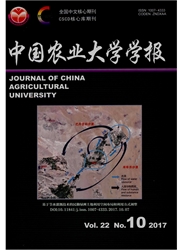

 中文摘要:
中文摘要:
采用随机前沿生产函数模型,对我国1 707个不同规模农户冬油菜生产技术效率进行实证分析。结果表明:我国油菜生产投工的产出弹性为0.153 5,处于劳动密集型阶段,且油菜种植规模与技术效率呈"U型"趋势。若消除技术无效率,会使现有油菜平均产出增加24.1%。效率损失函数显示:在小规模下,户主年龄(-3.225,估计系数,下同)、从事油菜劳动力(-0.501)、农技培训次数(-3.448)、收入水平(-0.567)、是否转包耕地(-0.366)等对技术效率有促进作用;农户家庭规模(0.476)、受教育程度(0.143)会产生阻碍作用;而在超大规模下,户主受教育程度(-0.251)、油菜种植面积(-0.171)、是否转包耕地(-0.540)对技术效率有促进作用;户主年龄(0.028)、农技培训次数(0.240)、是否外出务工(0.370)等会产生阻碍作用。
 英文摘要:
英文摘要:
Based on the model of stochastic frontier production function,this paper made an empirical analysis on winter rapeseed's technology efficiency and its influence factors with a sample of 1707 farmers in different production scales in China. The study showed that the labor output elasticity of rapeseed production was 0. 153 5, which meant it was still in the labor-intensive phase,and presented a "U" trend between rapeseed-cultivation scale and technical efficiency. If the technical inefficiency was eliminated, the average output of rapeseed would increase by 24. 1%. The efficiency loss function showed that,for the small-scale producers, householders' age( -3. 225, the estimated coefficients, the same below) ,labor force of engaged in rapeseed( - 0. 501 ), the times of technology training ( - 3. 448), income levels ( -0. 567) and subcontract of farmland ( - 0. 366)had positive impact on technical efficiency, meanwhile the scale of rural households(0. 476),level of education(0. 143) had negative effects. Whereas for the ultra-large-scale producers, the level of education( -0. 251),the size of rapeseed cultivation( -0. 171)and subcontract of farmland( -0. 540) had positive impacts on technical efficiency, but householders age (0. 028), the times of technology training (0. 240), outward employment or not (0,370)had negative effects.
 同期刊论文项目
同期刊论文项目
 同项目期刊论文
同项目期刊论文
 期刊信息
期刊信息
